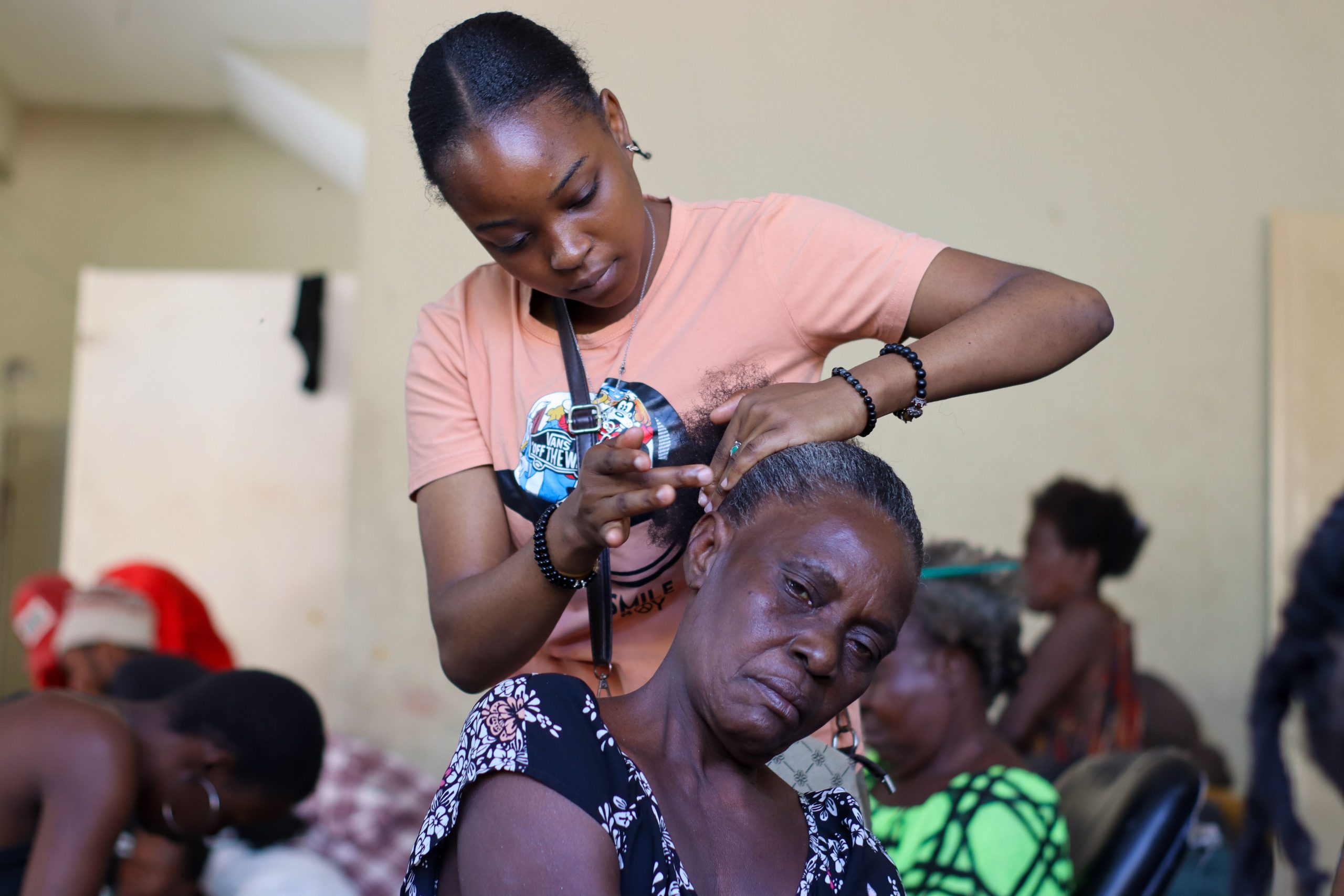Overview:
Several young people, united under the slogan “Pataje Lanmou,” offer beauty and healthcare services to elderly residents in Haiti’s displacement camps, where many have sought refuge from gang violence. Their initiative brings moments of dignity, joy, and hope to those who have lost so much.
PORT-AU-PRINCE, HAITI — On the eve of Valentine’s Day, as love filled the air, a group of young Haitians set out on a mission. A dozen of them—girls and boys alike—left their homes early on Feb. 13, bringing only their talents and a desire to uplift those in need. Their destination: a displacement camp at the Ministry of Communication, where they aimed to bring comfort, care, and dignity to victims of gang violence.”
“We feel so good. We could spend the whole day working without thinking about eating, as long as our hearts are happy to give love to the elderly,” said Maudeline “Fameuse Maude” Dérival, singer and initiator of the project.
“Elderly people are so neglected, we would love for this movement to spread throughout the country.”
Their simple yet profound gifts included beauty treatments—manicures, pedicures, haircuts—and a check on the elderly’s blood pressure, a gesture of concern for their well-being. But what they truly offered was a human connection, a reminder that they had not been forgotten.
Through their initiative, Pataje Lanmou—Creole for ‘Sharing Love’—these young volunteers have been bringing care and kindness to Haiti’s displacement camps. After visiting camps at the KIDS political party headquarters and Lycée des Jeunes Filles in December, they plan to continue their outreach on March 7.
-

One of the women receiving hair care and pedicure by the young girls from the “Pataje Lanmou” initiative at the displacement camp for victims of violence at the Ministry of Communication on February 13, 2025, on the eve of Valentine’s Day. Photo by Dieugo André for The Haitian Times.
-

Four of the many women who had fled gang violence in their neighborhoods received manicure and pedicure sessions during the visit of the young members of the “Pataje Lanmou” initiative at the refugee camp at the Ministry of Communication on February 13, 2025, on the eve of Valentine’s Day. Photo by Dieugo André for The Haitian Times.
Despite having no formal leader or institutional funding, the movement has gained momentum from an initial discussion among friends through word of mouth, fueled by young people and their family members willing to share what they have.
“Those who were willing decided to follow us. The motivation comes from the love we have for people,” said Dérival. “Fortunately, the elderly in the refugee camps were very happy. They cried. They would like us to return, but we are required to visit each camp once.”
“We feel so good. We could spend the whole day working without thinking about eating, as long as our hearts are happy to give love to the elderly.”
Maudeline “Fameuse Maude” Dérival, singer and initiator of this project.
One of the lucky women who shed tears that day was Juslène Fontale, 69, who has been living at the Ministry of Communication shelter since March 4, 2024. She was overwhelmed with gratitude, moved by the kindness of those strangers who had come to make her beautiful again.
“They made my face very, very beautiful. They styled my hair so well. I feel so fresh,” says Fontale with a smile. “I am very grateful for the work these young people have done for us. I pray that God protects them so they can continue thinking of us, the elderly.”

The Ministry of Communication, now a makeshift refugee camp, does not meet shelter standards for displaced people. Families sleep in overcrowded conditions, lacking essential sanitation and basic necessities. The camp is extremely unsanitary, with pregnant women, the elderly, and children left to survive on their own,l clinging to the hope of a better future.
Marie Eva Larrieux, another resident at the camp, shares a similar fate. A 60-year-old mother of two, she fled Carrefour-Feuilles and has been living at the Ministry of Communications for eight months. Her days are filled with uncertainty as she struggles to find food and mourns everything she has lost.
“My husband was coming back from a small job. They killed him, then burned his body. I couldn’t even find his remains to bury him,” Larrieux says.
On top of her loss, she has been stripped of her means of survival. Her business—selling matches, candles, and other small goods—was reduced to ashes.
“Additionally, I lost more than 15 cartons of blackato, 10 cases of matches, and 5 cases of candles. And I can no longer do laundry work.”

According to the International Organization for Migration (IOM), more than a million people have been displaced in Haiti. With each passing day, these survivors face mounting hardships, their hopes dimming as gang attacks continue to uproot communities.
“Pataje Lanmou” brings a moment of relief
For a few hours that day, the elderly at the camp set aside their worries. Near the ministry’s old generator, they gathered in a makeshift salon eager to be pampered. Women dipped their hands and feet into bowls of water for manicures and pedicures, while men sat in chairs getting fresh haircuts. others have their blood pressure checked.
.
About twenty men and women entrusted their hair, nails, and health to this group of young people, whose only support comes from voluntary contributions by friends and family.
Their faces softened by a smile reflecting a rare moment of contentment.
“I feel alive seeing these young people come to us and do for us what our children should do if we were at home,” said Larrieux as her feet soaked. “I feel strong and full of hope because if God allowed these young people to come and offer us this cleaning session, it’s a sign.”

For Dérival who gained fame in a singing competition in the country, this initiative is more than an act of kindness, it is a statement of the hope that refugees will not remain in this vulnerable situation forever.
“This type of activity brings hope to people and comforts them by showing them that we care about them,” she said. “This event nurtures the belief that the displaced people will not remain in these conditions forever.”
These young volunteers, bound by their love of music, theater, and dance, promise to continue supporting the elderly and children as long as their limited resources allow. They see their gesture as a call to action, a way to foster love, advocate for justice for victims, and champion well-being for all.
“The message is that we can change the nation with love and justice,” says Dérival. “If we unite around positive actions, Haiti will become a paradise for all.”


















